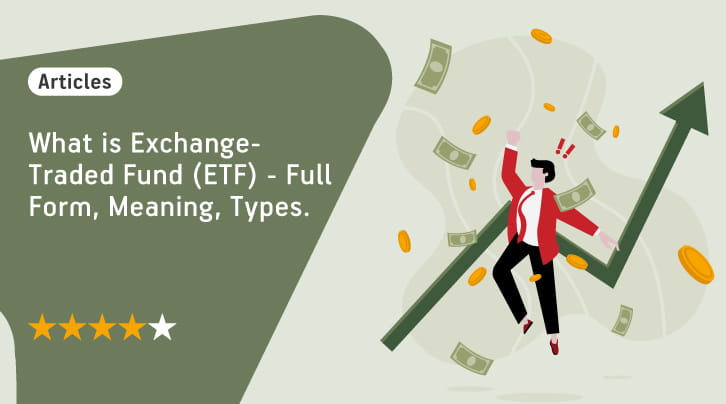In today's quickly changing financial scenario, investors face a variety of investment opportunities. This diversity can often appear confusing and daunting. The Exchange-Traded Fund (ETF), a financial product that has surged in popularity over recent years, is an example of one such possibility.
Shortened to ETFs for convenience, the ETF full form is Exchange-Traded Funds. These ETFs have revolutionized participation methods for both individuals and institutions within the markets. This article explores the ETF meaning along with the benefits of investing in ETFs.
Exchange Trade Fund (ETF) Meaning
An ETF, or exchange traded fund, is a basket of marketable securities such as equities or bonds that tracks an underlying index. ETFs allows you to invest in various securities at once, and track indexes such as BSE Sensex or CNX Nifty. An Exchange-Traded Fund (ETF) aims to provide investors with exposure to a broad portfolio of assets like stocks, bonds, and commodities or even various combinations of these. Like individual stocks, an ETF is essentially a mix of these diverse assets. It can be bought or sold on stock markets.
The ETF definition gives an idea of its goal. The primary aim of an ETF, offering its participants a simple way to diversify their investments across multiple categories, is tracking the performance of an underlying index or of a particular asset class.
How Does ETF Work?
It's crucial to understand the structure and mechanics of ETFs in order to comprehend how they operate. Financial institutions or asset management firms design and oversee the administration of ETFs. These organizations put up a portfolio of assets that closely resembles a certain index or market sector. Throughout the trading day, investors can buy and sell shares or units of this portfolio on stock exchanges.
An essential component of the operation of an ETF is the process of creation and redemption. In this procedure, Market Makers are essential. The ETF issuer allows APs, who are frequently sizable financial institutions, to issue new ETF shares or redeem existing ones.
When a demand for ETF shares arises, Market Makers engage in a transaction. They procure the underlying assets and offer them to the ETF issuer in return for freshly minted shares. Conversely, should there be an excess, APs can redeem them by returning those same shares back to the issuer. Thus, exchanging them for their original form, exchange-traded fund underlying assets.
This process of creation and redemption guarantees a robust correlation between the market price of the ETF and its underlying assets' net asset value (NAV), thus reducing substantial discrepancies between them.
Types of ETFs
ETFs are available in a variety of formats to accommodate many different asset classes and investing strategies. Here are a few popular ETF types:
Equity ETFs
Equity ETFs follow stock indices and give investors exposure to particular markets, industries, or geographical areas.
Bond ETFs
Bond ETFs follow numerous fixed-income instruments and provide investors with a liquid and diversified alternative to invest in bonds.
Commodity ETFs
Commodity funds provide investors access to commodities such as gold, oil, or agricultural items without actually owning them.
Sector ETFs
Investors may target industries like technology, healthcare, or energy with the help of sector-specific ETFs, which concentrate on a single economic sector.
Benefits of Investing in ETFs
Investing in ETFs has a number of benefits that appeal to a variety of investors, including:
Diversification
By holding a variety of assets, ETFs reduce the risk associated with investing in a single stock.
Tax Efficiency
Due to the formation and redemption processes, ETFs often produce less capital gains and are thus noted for their tax efficiency.
Transparency
ETFs frequently report their holdings, giving investors access to information about the assets they control.
Liquidity
ETFs trade on stock exchanges, providing high liquidity that enables investors to purchase and sell shares throughout the trading day.
Low Costs
Compared to actively managed mutual funds, ETFs often offer lower cost ratios.
Versatility
Because ETFs may be traded like stocks, they give investors the freedom to add and exit holdings whenever they choose during market hours.
How to Invest in ETFs?
It's simple to invest in ETFs by following these steps:
You must create a demat account with a reputable brokerage company in order to invest in ETFs.
Carry out research to find the ETFs that suit your investing objectives and risk appetite. Consider elements including the fund's goals, holdings, past performance, and costs.
After deciding which ETFs to invest in, make an order through your demat account, indicating the quantity of shares you wish to purchase.
Monitor your ETF investments and make necessary portfolio adjustments to achieve your financial goals.
Factors to Consider Before Investing in ETFs
It's crucial to take the following aspects into account before plunging into the world of ETFs:
Investment Objectives
To choose the best ETFs, decide on your investment goals, risk tolerance, and time horizon.
Expense Ratios
Examine the various ETFs' expense ratios because decreasing costs can have a big influence on long-term results.
Liquidity
Make sure the ETFs you select have enough trading activity to offer liquidity when purchasing or selling shares.
Tax Implications
Recognize how investing in ETFs may affect your taxes, particularly any potential capital gains taxes.
Research and Due Diligence
Perform in-depth research on the ETFs you intend to invest in, including information on their holdings, past performance, and issuer reputation.
Conclusion
Flexible, transparent, and cost-effective Exchange-Traded Funds (ETFs) have cemented their place as a key component in modern investment portfolios. Both seasoned and new investors find them appealing because they provide diversified exposure to multiple asset classes.
Mutual Fund investments are subject to market risks, read all scheme related documents carefully.





 1800-270-7000
1800-270-7000




